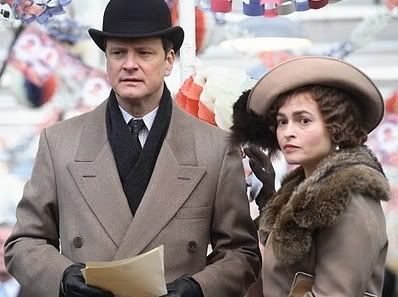
The Duke of York (Colin Firth) is a stutterer, which is destined to make public life difficult. His wife Elizabeth (Helena Bonham Carter) searches for a speech therapist, encountering some quacks along the way, and finally finds Lionel Loque (Geoffrey Rush), an eccentric wanna-be actor who demands more commitment and trust than this royal couple is willing to give. He insists on doing therapy in his office instead of going to the royals' home for discretion, demands the Duke call him by his first name, and refuses to refer to the Duke with any name other than "Bertie." Eventually King George V (Michael Gambon) dies, the Duke's older brother King Edward VIII (Guy Pearce) is forced to step down amidst scandal, and the Duke of York ascends to the throne. Now King George VI, who can barely speak without stuttering, must deliver an address to his people to help them prepare for the coming storm of World War II.
Most of the acting in The King's Speech is superb. Firth is simultaneously as regal and intimidating as you might expect a king to be, and as vulnerable and self-conscious as a man with a pronounced speech impediment. Carter does wonderfully as Queen Elizabeth, and frankly it's just refreshing to see her in a role where she not only isn't a psycho/killer/slut, but the very picture of royal refinement. Rush is very believable as the animated failed thespian Lionel Loque. The only performance that really bothered me was Timothy Spall (perhaps best known as Wormtail in the Harry Potter movies) as Winston Churchill. Spall's Churchill is a complete caricature. Luckily he's not in the film much.
The story is a bit predictable at times, but you definitely end up caring about George VI and Loque and root for them. It's uplifting and you may even tear up a little bit. But it is certainly not a perfect movie. I agree with a lot of what my friend Kate Laity wrote about the film, particularly with what she wrote about the camera angles taking you "out of the narrative." As I watched the film, I struggled to figure out why those camera angles were being used, if there was something the filmmakers were trying to convey, and all I'm left with is that they were trying to tell us, "We're so artistic, man! Look at our freaky camera angles!"
I had the same thought Kate did about Loque calling George VI the "bravest man" he'd ever known, and kind of along those lines I think there's something that, for me, defused any emotional impact of The King's Speech's climax. George VI's speech was made at the dawn of World War II - a terrible conflict that was probably the closest thing our world has ever seen to a man-made apocalypse. It touched every corner of the world. It killed millions and millions of soldiers and civilians. It saw Hitler's holocaust. It saw the atomic bombing of Hiroshima and Nagasaki, not to mention the ruthless carpet bombing of European and Japanese cities, the attack on Pearl Harbor, the Bataan Death March, the firebombing of Dresden, the Luftwaffe's merciless assault on Britain and too many pictures of Hell to list here.
And at the end of The King's Speech, what we as an audience are celebrating is the fact that a guy didn't stutter all that much when he talked on the radio.
That's not to say George VI's personal victory isn't meaningful. It is. But in the shadow of World War II it seems silly and I don't think the filmmakers do much to make me think otherwise. As I watched the end of the film, I felt good for George VI and his victory over his impediment. But beforehand as he suffered over whether or not he would succeed, he never seemed to worry about his people or the firestorm that was coming. He was just worried he'd humiliate himself. On one hand that's a very human, believable reaction. On the other, I feel like I'm meant to not recognize the inherent pettiness and just root for Good ol' George.
Overall, I think The King's Speech is a good movie with some great acting, but I'm not sure it deserves all of the accolades it's received.

1 comment:
Yeah, pretty much agree with you there, Mick. That's what really bothered me: the approach of war seems nothing next to -- gasp! -- a man stuttering.
Post a Comment